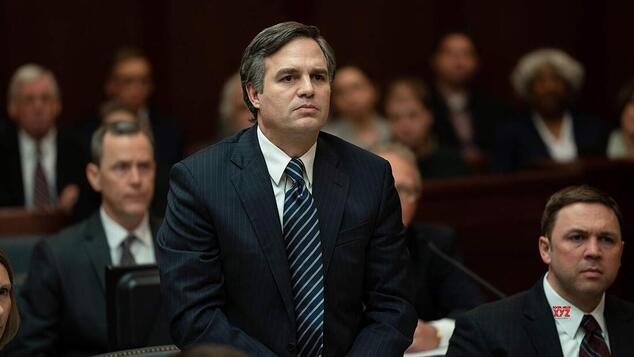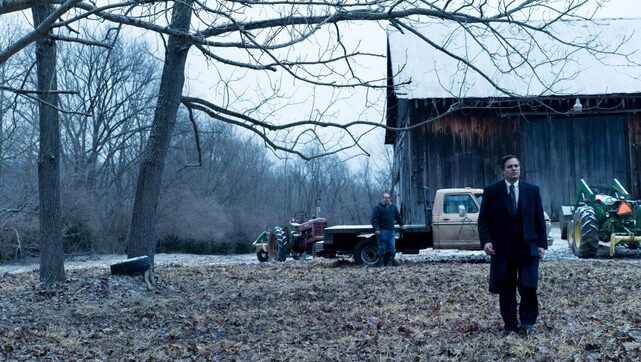DARK WATERS
****
Director: Todd Haynes
Screenwriters: Mario Correa and Matthew Michael Carnahan, based on The New York Times Magazine article “The Lawyer Who Became DuPont’s Worst Nightmare” by Nathaniel Rich.
Principal cast:
Mark Ruffalo
Anne Hathaway
Tim Robbins
Bill Pullman
Bill Camp
Victor Garber
Country: USA
Classification: M
Runtime: 126 mins.
Australian release date: 5 March 2020.
Dark Waters, the new film from Todd Haynes, seems like an odd choice from the director of such strikingly unusual movies as Velvet Goldmine, Far From Heaven, I’m Not There and Carol, because it stems from a more mundane (regrettably) story about a lone individual fighting against the might of one of the USA’s biggest companies. It doesn’t seem to be the type of subject that would appeal to Haynes, until you learn that he is a huge fan of the whistleblower genre, movies from the ‘70s, ‘80s and ‘90s like The Parallax View, All The President’s Men, Silkwood and The Insider. It’s not the information revealed in these films that he’s interested in though; he says, “… the whistleblower film’s true focus is on the little guy, his or her process, and the peril - psychic, emotional, if not mortal - faced by that individual who stands up to the truth.” That’s certainly true of Dark Waters, in which “the little guy” is Rob Bilott, a corporate defence attorney who turned on his big business paymasters when he recognised the depth of their deception and the horror of its consequences.
Bilott (a masterful turn by Mark Ruffalo) comes from the West Virginian backwater town of Parkersburg, a town whose primary employer is the chemical company DuPont, whose slogan for many years was ‘Better Living Through Chemistry.’ Oh, the irony! Hard work has earned him a partnership with the national law firm Taft in Cincinnati and his work there involves defending some of the biggest names in ‘Big Chem’. When a couple of farmers from Parkersburg, Wilbur Tennant (Bill Camp) and his brother, visit him to drop off a box of videotapes (the year is 1975) that they claim contains evidence that DuPont’s chemical run-off is killing their cattle, he reluctantly says he’ll look into the matter - but only because his grandmother still lives in the town. What he finds astounds him as, bit by bit, he doggedly amasses evidence that DuPont always knew that the perfluorooctanoic acid (PFOA) or ‘forever chemicals’ (so-called because they never breakdown) used in the manufacture of Teflon caused cancer in animals and people and birth defects in babies. To his wife’s (Anne Hathaway) amazement, he realises that, “The system is rigged. They want us to believe that it'll protect us, but that's a lie. We protect us. We do. Nobody else. Not the companies, not the scientists, not the government. Us.” With the support of his supervising partner in the law firm, Tom Terp (Tim Robbins), Bilott’s desire for justice stays strong through 20 years of obfuscation and setbacks, taking a toll on his marriage, his health, his work and his income, but “the little guy” never gives up.
Ruffalo carries Dark Waters - he’s in almost every frame. This is not surprising because he has been driving this project forward since he first read Nathaniel Rich’s article and, indeed, it was he who brought the idea to Haynes. A committed environmentalist, and one of the film’s producers, he was the perfect person to play this unlikely hero. Bilott is a decent and honourable man but he also exhibits the guarded and taciturn demeanour of a typical lawyer. He’s the quintessential company man until he stumbles across DuPont’s transgressions, at which point his world view changes dramatically, and Ruffalo captures his confusion and disillusionment faultlessly. Watching his bewilderment as his character realises the depth of the company’s deception and subterfuge is enthralling. As Ruffalo says, “At the outset, Rob [Bilott] really believes that corporations are people and in the concept of their self-governance. He reasons that this must be some simple oversight. What ends up happening is he uncovers this contamination and cover-up, perpetrated by DuPont and spanning 40 years.” There’s a lot to take in in Dark Waters but don’t be put off by that - it’s a fascinating story. And a scandalous one!
Addendum
In an extraordinary example of synchronicity, the week before Dark Waters was released in Australia, the government settled three class actions with the communities of Williamtown, Oakey and Katherine over the contamination of their homes by chemicals similar to those in the Parkersburg case. The residents’ locales had been polluted by these ‘endocrine disruptors’ because they were used in firefighting foams regularly sprayed near them. In this case, however, the products were manufactured by 3M, not DuPont, although it’s doubtful that would matter to those affected. The resulting cancers and diseases are just as toxic.
Screenwriters: Mario Correa and Matthew Michael Carnahan, based on The New York Times Magazine article “The Lawyer Who Became DuPont’s Worst Nightmare” by Nathaniel Rich.
Principal cast:
Mark Ruffalo
Anne Hathaway
Tim Robbins
Bill Pullman
Bill Camp
Victor Garber
Country: USA
Classification: M
Runtime: 126 mins.
Australian release date: 5 March 2020.
Dark Waters, the new film from Todd Haynes, seems like an odd choice from the director of such strikingly unusual movies as Velvet Goldmine, Far From Heaven, I’m Not There and Carol, because it stems from a more mundane (regrettably) story about a lone individual fighting against the might of one of the USA’s biggest companies. It doesn’t seem to be the type of subject that would appeal to Haynes, until you learn that he is a huge fan of the whistleblower genre, movies from the ‘70s, ‘80s and ‘90s like The Parallax View, All The President’s Men, Silkwood and The Insider. It’s not the information revealed in these films that he’s interested in though; he says, “… the whistleblower film’s true focus is on the little guy, his or her process, and the peril - psychic, emotional, if not mortal - faced by that individual who stands up to the truth.” That’s certainly true of Dark Waters, in which “the little guy” is Rob Bilott, a corporate defence attorney who turned on his big business paymasters when he recognised the depth of their deception and the horror of its consequences.
Bilott (a masterful turn by Mark Ruffalo) comes from the West Virginian backwater town of Parkersburg, a town whose primary employer is the chemical company DuPont, whose slogan for many years was ‘Better Living Through Chemistry.’ Oh, the irony! Hard work has earned him a partnership with the national law firm Taft in Cincinnati and his work there involves defending some of the biggest names in ‘Big Chem’. When a couple of farmers from Parkersburg, Wilbur Tennant (Bill Camp) and his brother, visit him to drop off a box of videotapes (the year is 1975) that they claim contains evidence that DuPont’s chemical run-off is killing their cattle, he reluctantly says he’ll look into the matter - but only because his grandmother still lives in the town. What he finds astounds him as, bit by bit, he doggedly amasses evidence that DuPont always knew that the perfluorooctanoic acid (PFOA) or ‘forever chemicals’ (so-called because they never breakdown) used in the manufacture of Teflon caused cancer in animals and people and birth defects in babies. To his wife’s (Anne Hathaway) amazement, he realises that, “The system is rigged. They want us to believe that it'll protect us, but that's a lie. We protect us. We do. Nobody else. Not the companies, not the scientists, not the government. Us.” With the support of his supervising partner in the law firm, Tom Terp (Tim Robbins), Bilott’s desire for justice stays strong through 20 years of obfuscation and setbacks, taking a toll on his marriage, his health, his work and his income, but “the little guy” never gives up.
Ruffalo carries Dark Waters - he’s in almost every frame. This is not surprising because he has been driving this project forward since he first read Nathaniel Rich’s article and, indeed, it was he who brought the idea to Haynes. A committed environmentalist, and one of the film’s producers, he was the perfect person to play this unlikely hero. Bilott is a decent and honourable man but he also exhibits the guarded and taciturn demeanour of a typical lawyer. He’s the quintessential company man until he stumbles across DuPont’s transgressions, at which point his world view changes dramatically, and Ruffalo captures his confusion and disillusionment faultlessly. Watching his bewilderment as his character realises the depth of the company’s deception and subterfuge is enthralling. As Ruffalo says, “At the outset, Rob [Bilott] really believes that corporations are people and in the concept of their self-governance. He reasons that this must be some simple oversight. What ends up happening is he uncovers this contamination and cover-up, perpetrated by DuPont and spanning 40 years.” There’s a lot to take in in Dark Waters but don’t be put off by that - it’s a fascinating story. And a scandalous one!
Addendum
In an extraordinary example of synchronicity, the week before Dark Waters was released in Australia, the government settled three class actions with the communities of Williamtown, Oakey and Katherine over the contamination of their homes by chemicals similar to those in the Parkersburg case. The residents’ locales had been polluted by these ‘endocrine disruptors’ because they were used in firefighting foams regularly sprayed near them. In this case, however, the products were manufactured by 3M, not DuPont, although it’s doubtful that would matter to those affected. The resulting cancers and diseases are just as toxic.

